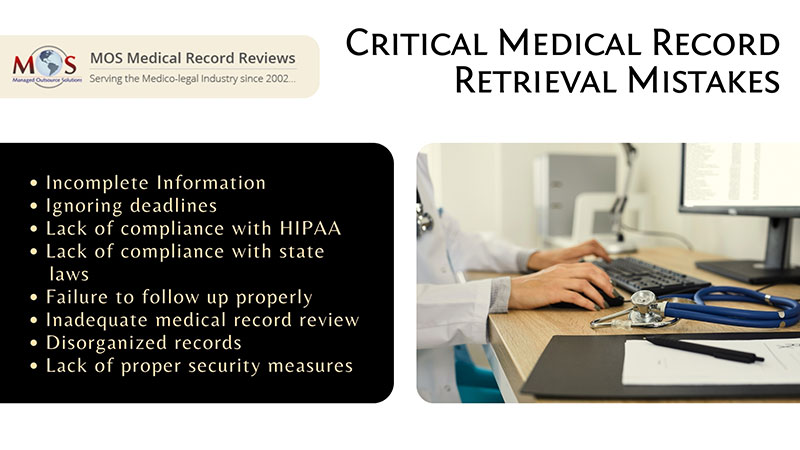In any law firm handling personal injury, product liability, or workers’ compensation cases, medical record retrieval is an important requirement. Paper records have now been replaced with electronic medical records, and this is aimed at helping with the retrieval, organization and review of the records. Though many disadvantages of paper records have been addressed with the introduction of the EHR, some common concerns or challenges remain. These challenges could lead to mistakes that attorneys and their legal teams must necessarily avoid, and these could range from failing to locate multiple providers to maintaining HIPAA compliance.
MOS ensures that you have the medical records you need, when you need them.
Medical Record Retrieval Mistakes to Avoid
- Incomplete or Erroneous Information: Providing incomplete or inaccurate patient details when requesting medical records can delay the retrieval process. You might also end up receiving the wrong records.
- Missing Deadlines: Failing to adhere to deadlines for requesting medical records can significantly impact legal proceedings, leading to delays or even dismissal of cases.
- Insufficient Follow-Up: Not following up on requests can lead to delays in receiving the necessary medical records. Persistent follow-up is crucial to ensure timely retrieval.
- Ignoring HIPAA Regulations: Violating patient privacy laws such as HIPAA by mishandling or improperly sharing medical records can result in legal repercussions.
- State Laws: 13 U.S. states have medical record legislation that is stricter than HIPAA. Attorneys must have a clear idea regarding these rules to avoid mistakes in the retrieval process.
- Relying Solely on Paper-based Requests: In an increasingly digital world, relying totally on traditional paper-based requests can slow down the process. Utilizing electronic requests or secure online portals can expedite retrieval.
- Failure to Confirm Receipt: Neglecting to confirm receipt of the requested records can lead to misunderstandings and assumptions, causing delays or missing information.
- Incomplete Record Review: Not thoroughly reviewing the medical records for completeness can result in missing vital information crucial for legal proceedings.
- Inadequate Record Organization: Poorly organizing or documenting retrieved records can lead to difficulties in referencing or using the information effectively during the legal process.
- Failure to Identify all Relevant Providers: There could be a number of providers ranging from hospitals, clinics, surgeons, and general physicians to physical and occupational therapists among others. First responders and ambulance providers are also part of this group, with each provider having individual medical and billing records.
- Incorrect Authorization Forms: Medical record requests from attorneys are often rejected when the authorization forms used are outdated, incomplete, or inadequate in some other way. So, it should be ensured that the forms include all necessary information and are up-to-date.
- Failure to Request Specialized Medical Records: Substance abuse treatment records and mental health records are among the specialized medical records. Failing to obtain these may hinder the case.
- Lack of Communication with Clients: When the importance of timely and accurate information is not properly communicated to clients, it will lead to imprecise record requests and delays.
- Not Redacting Sensitive Information: Failure to redact sensitive or irrelevant information from medical records before using them in legal proceedings could have grave consequences. It could cause privacy breaches or lead to unintended disclosures.
- Not Obtaining the Complete Medical Record from Providers: Often, you may need to specify each medical record necessary such as original doctor notes, patient visit summaries, lab test results including notes and analyses, complete set of scans, X-rays, record of past surgeries, family history details and so on.
- Failure to Put in Place Strong Security Measures: This mistake could lead to serious cybersecurity risks. Attorneys should ensure the secure handling and storage of sensitive medical information to avoid data breaches.
- Not Establishing Clear Deadlines and Follow-Up Procedures: There is a possibility that healthcare providers might delay or withhold the medical records. This will impact case timelines. Therefore, attorneys must establish clear deadlines and communicate the same to the providers to avoid delays in medical record retrieval.
- Not Verifying the Authenticity of the Medical Records: This could result in the attorney receiving inaccurate, incomplete, and may be even altered medical records.
Benefit from the services of one of the fastest medical record retrieval companies in the U.S. Place a request!
Best Practices for Efficient Medical Record Retrieval
Now that we have had an overview of the common mistakes associated with the retrieval of medical records, here are some best practices attorneys can consider to ensure more efficiency in the process.
- Utilize Technology: Implement electronic record retrieval systems or secure online portals provided by healthcare facilities to streamline and expedite the process.
- Establish Clear Communication Channels: Maintain open communication with healthcare providers to ensure clarity regarding requests and deadlines. This will help reduce the chances of errors or delays.
- Train Staff Adequately: Provide proper training to staff members involved in the retrieval process to ensure they understand the nuances of medical record requests and compliance requirements.
- Standardize Processes: Develop standardized protocols for requesting, receiving, reviewing, and storing medical records to maintain consistency and efficiency.
- Quality Assurance Checks: Conduct thorough quality checks on the received records to ensure completeness and accuracy, minimizing the risk of missing crucial information.
- Adherence to HIPAA Guidelines: Ensure strict adherence to HIPAA regulations throughout the retrieval process to protect patient confidentiality and avoid legal issues.
- Document Everything: Maintain meticulous records of all communication, requests, and follow-ups to track the progress of record retrieval and resolve any discrepancies.
Advantages of Partnering with a Medical Record Review Company
Attorneys can utilize medical record retrieval services provided by a medical record review company and benefit from increased efficiency and accuracy in the process. With the record retrieval process outsourced, attorneys and their teams can focus on other important tasks.
- A medical record retrieval service would focus on retrieving the data as quickly as possible in the most cost-effective way possible.
- Typically, these service providers have close associations and connections all over the country. So, they interact with the medical record custodians and are responsible for getting a complete set of medical records. Such services are a great boon for attorneys because they make the record request on accurate approval forms, and follow up in a timely manner so that the records are obtained and maintained safely and securely.
- To help track real-time requests with minimal disruption to clients, they use a centralized platform to store and access the medical records.
- The retrieval process is faster because they utilize web-based medical record retrieval, aggregation, indexing and storage.
- A professional provider of medical review solutions efficiently utilizes NLP (Natural Language Processing) and OCR (Optical Character Recognition) services to eliminate the complexities of medical record retrieval.
- They ensure accuracy and consistency of the medical records by standardizing the data entry process.
- The collected and organized medical records are made easily searchable if needed. This is achieved by tagging the records with appropriate keywords. This strategy also helps with easier and more efficient handling of high-volume medical records.
Attorneys can choose to utilize expert medical record retrieval services and maximize their ability to recognize, obtain and analyze medical data quickly and easily.





